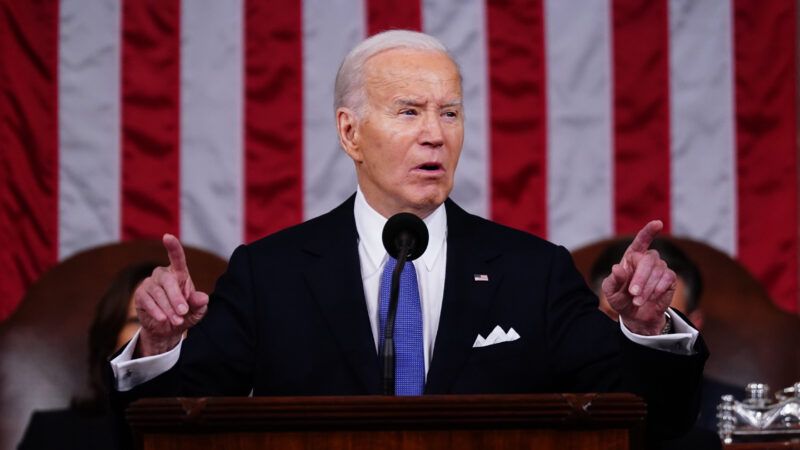DEA Moves To Reclassify Marijuana as a Schedule III Drug
For over 50 years, marijuana has been in the same category of controlled substances as heroin and LSD. The DEA is finally proposing to end that ludicrous policy.

The Justice Department formally, finally, proposed to stop lying about marijuana today after decades of insisting the drug is comparable to heroin and ecstasy—and more dangerous than cocaine and methamphetamine.
The Drug Enforcement Administration (DEA), in a proposed rule sent to the Federal Register, moved to change marijuana's status from a Schedule I drug under the Controlled Substances Act—considered by the government to be highly abuse-prone drugs with no medical value—to a Schedule III drug. Recreational marijuana possession and use would remain illegal under federal law, and any new cannabis-based medications would still require approval from the Food and Drug Administration.
President Joe Biden directed the Justice Department and the Department of Health and Human Services (HHS) in 2022 to review marijuana's status as a Schedule I drug. In 2023, HHS recommended that marijuana be moved to Schedule III, which includes drugs with a medium risk of abuse and accepted medical use.
On the campaign trail in 2020, Biden promised to "decriminalize the use of cannabis," but despite lamenting the injustices of marijuana convictions and the barriers they create, and despite the continuing collapse of public support for marijuana prohibition, Biden still opposes full-scale legalization. Instead, his administration has focused on mass pardons and other measures that largely leave those injustices in place.
As Reason's Jacob Sullum wrote earlier this month, after news of the impending proposal first broke, rescheduling marijuana may allow for more medical research and be a good election-year talking point for Biden, but it won't end the continuing federal prohibition of cannabis:
Rescheduling marijuana will not resolve the conflict between the CSA and the laws of the 38 states that recognize cannabis as a medicine, 24 of which also allow recreational use. State-licensed marijuana businesses will remain criminal enterprises under federal law, exposing them to the risk of prosecution and forfeiture. While an annually renewed spending rider protects medical marijuana suppliers from those risks, prosecutorial discretion is the only thing that protects businesses serving the recreational market.
Even if they have state licenses, marijuana suppliers will be in the same legal position as anyone who sells a Schedule III drug without federal permission. Unauthorized distribution is punishable by up to 10 years in prison for a first offense and up to 20 years for subsequent offenses. That is less severe than the current federal penalties for growing or distributing marijuana, which include five-year, 10-year, and 20-year mandatory minimum sentences, depending on the number of plants or amount of marijuana. But distributing cannabis, with or without state permission, will remain a felony.
But even getting the DEA to acknowledge that marijuana is not a drug on par with LSD and heroin is a victory of sorts.
In 2012, Barack Obama's head of the DEA, Michele Leonhart, refused to say whether drugs like crack cocaine and heroin were worse than marijuana, only offering the weak response that "all illegal drugs are bad."
Chuck Rosenberg, who followed Leonhart as head of the DEA, also equivocated when asked the same question in 2015: "If you want me to say that marijuana's not dangerous, I'm not going to say that because I think it is," Rosenberg said on a conference call with reporters. "Do I think it's as dangerous as heroin? Probably not. I'm not an expert."
Rosenberg clarified his statements a week later, saying, "Heroin is clearly more dangerous than marijuana."
Still, the federal government decided to keep embarrassing itself for nearly another decade before moving to drop marijuana from Schedule I.
The DEA's rescheduling proposal will now go through a public comment period.


Show Comments (39)